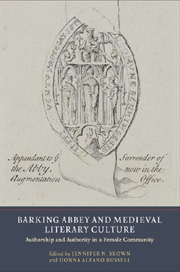Book contents
- Frontmatter
- Contents
- List of Contributors
- Acknowledgements
- List of Abbreviations
- Dedication
- Introduction: Barking's Lives, the Abbey and its Abbesses
- I BARKING ABBEY AND ITS ANGLO-SAXON CONTEXT
- II BARKING ABBEY AND ITS ANGLO-NORMAN CONTEXT
- 5 ‘Sun num n'i vult dire a ore’: Identity Matters at Barking Abbey
- 6 ‘Ce qu'ens li trovat, eut en sei’: On the Equal Chastity of Queen Edith and King Edward in the Nun of Barking's La Vie d'Edouard le confesseur
- 7 Body, Gender and Nation in the Lives of Edward the Confessor
- 8 Clemence and Catherine: The Life of St Catherine in its Norman and Anglo-Norman Context
- 9 Cicero, Aelred and Guernes: The Politics of Love in Clemence of Barking's Catherine
- 10 The Authority of Diversity: Communal Patronage in Le Gracial
- III BARKING ABBEY AND THE LATER MIDDLE AGES
- Afterword. Barking and the Historiography of Female Community
- Bibliography
- Index
- YORK MEDIEVAL PRESS: PUBLICATIONS
9 - Cicero, Aelred and Guernes: The Politics of Love in Clemence of Barking's Catherine
from II - BARKING ABBEY AND ITS ANGLO-NORMAN CONTEXT
Published online by Cambridge University Press: 05 April 2013
- Frontmatter
- Contents
- List of Contributors
- Acknowledgements
- List of Abbreviations
- Dedication
- Introduction: Barking's Lives, the Abbey and its Abbesses
- I BARKING ABBEY AND ITS ANGLO-SAXON CONTEXT
- II BARKING ABBEY AND ITS ANGLO-NORMAN CONTEXT
- 5 ‘Sun num n'i vult dire a ore’: Identity Matters at Barking Abbey
- 6 ‘Ce qu'ens li trovat, eut en sei’: On the Equal Chastity of Queen Edith and King Edward in the Nun of Barking's La Vie d'Edouard le confesseur
- 7 Body, Gender and Nation in the Lives of Edward the Confessor
- 8 Clemence and Catherine: The Life of St Catherine in its Norman and Anglo-Norman Context
- 9 Cicero, Aelred and Guernes: The Politics of Love in Clemence of Barking's Catherine
- 10 The Authority of Diversity: Communal Patronage in Le Gracial
- III BARKING ABBEY AND THE LATER MIDDLE AGES
- Afterword. Barking and the Historiography of Female Community
- Bibliography
- Index
- YORK MEDIEVAL PRESS: PUBLICATIONS
Summary
This chapter examines the political relevance of love and spiritual friendship in Clemence of Barking's La Vie de St Catherine d'Alexandrie. Her Catherine extends the work of the Barking La Vie d'Edouard le confesseur (Edouard) by using the conventions of romance to explore the sacramental love that holds the body politic together and binds it to Christ in friendship. I argue that Clemence derives her model of friendship from Aelred of Rievaulx's De spirituali amicitia, a widely circulated revision of Cicero's De amicitia (Laelius) for the monastic life. I also posit that Clemence's emphasis on spiritual friendship can be seen as a response to the tensions caused by the Becket controversy, which were further amplified by some of the literature and liturgies composed to commemorate his martyrdom. Becket's death had a direct impact on the abbacy at Barking and provides an essential context for Clemence's Catherine. This impact is visible in Henry II's appointment of Mary Becket to the abbacy (1173–5) and in the commissioning of Guernes of Pont-Sainte-Maxence's La Vie de St Thomas le martyr de Cantorbrie at Barking during her tenure. As I discuss below, Clemence's Catherine emphasizes issues of coordinate power central to this controversy. In doing so, Clemence's revision could be seen as a corrective to penitential, images that place Becket (and, by extension, the English episcopacy) in the light of God's favour and the secular court in a secondary, submissive position vis-à-vis episcopal authority.
- Type
- Chapter
- Information
- Barking Abbey and Medieval Literary CultureAuthorship and Authority in a Female Community, pp. 183 - 209Publisher: Boydell & BrewerPrint publication year: 2012



